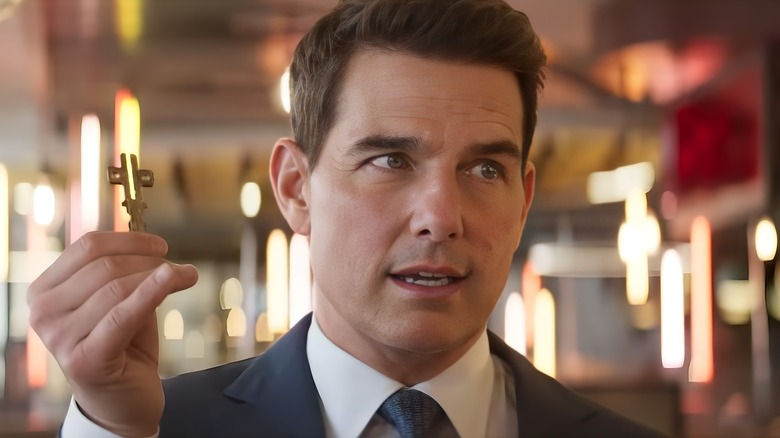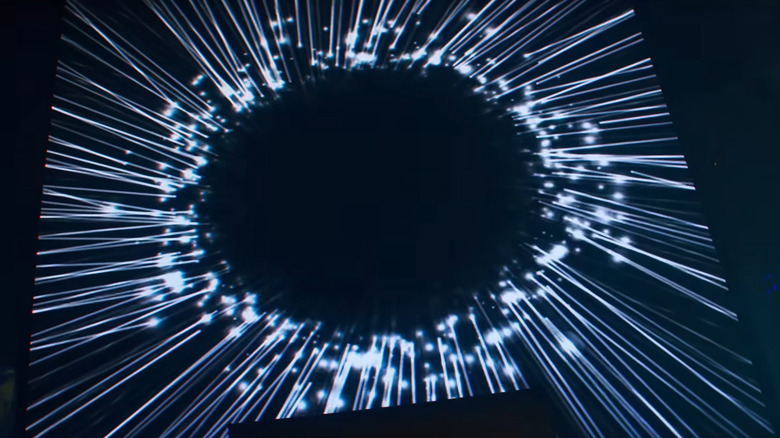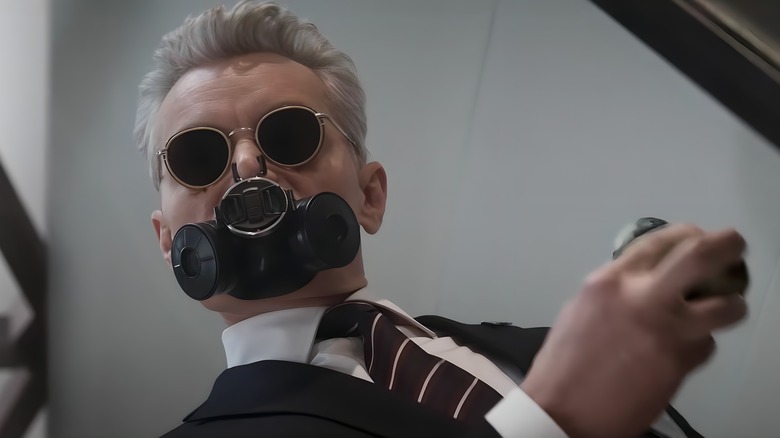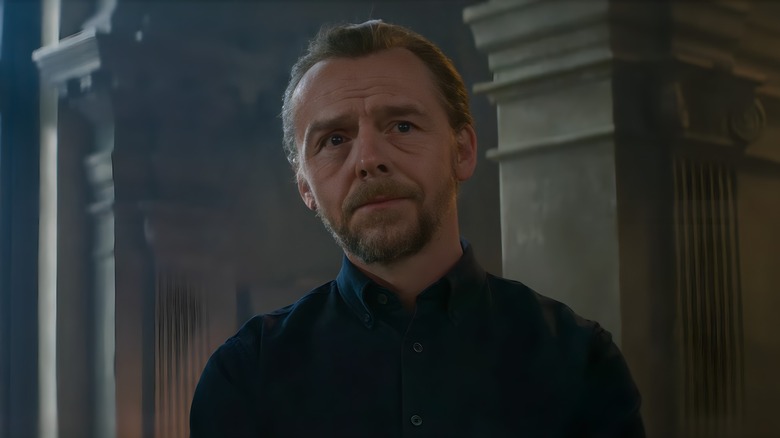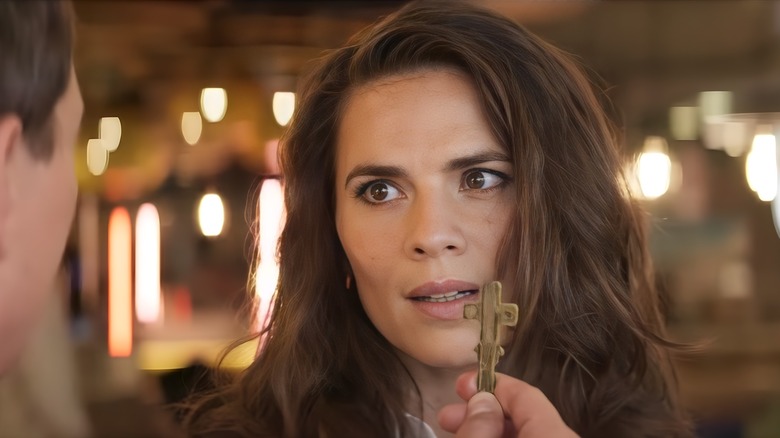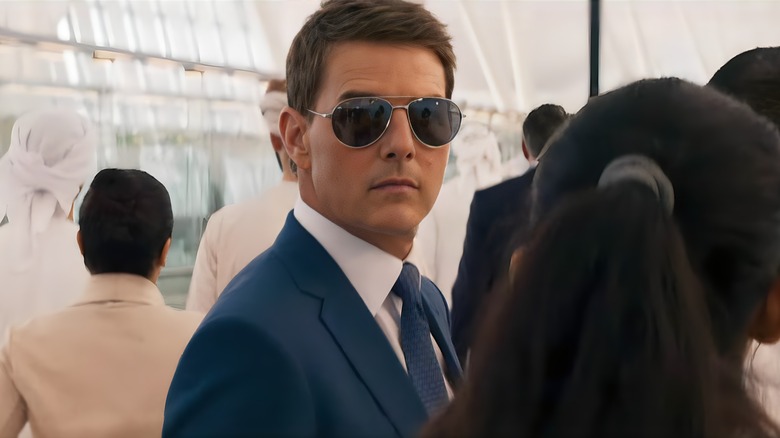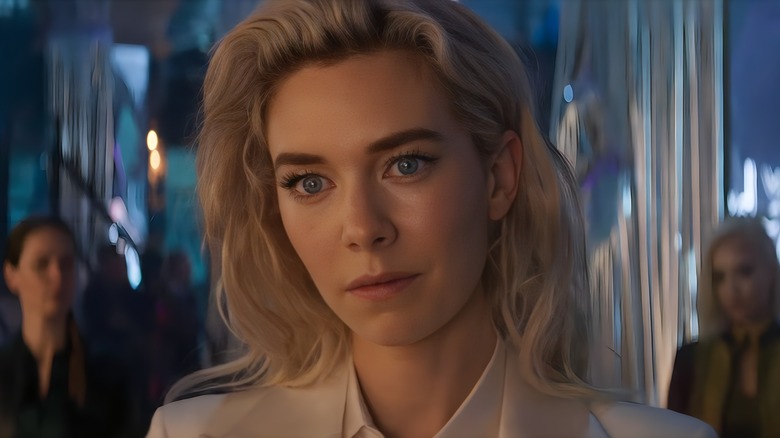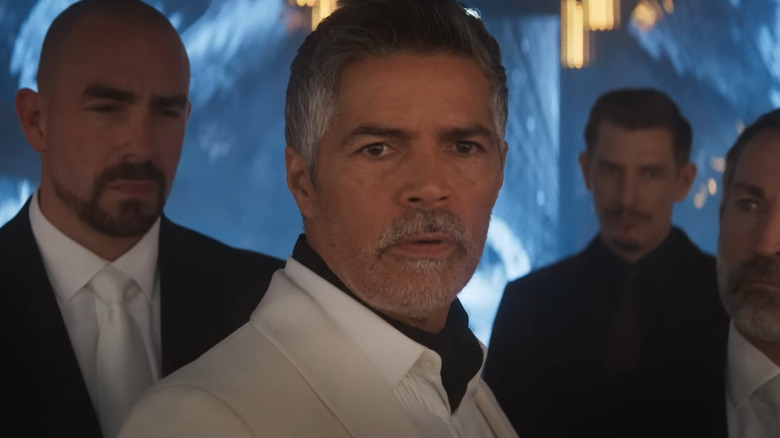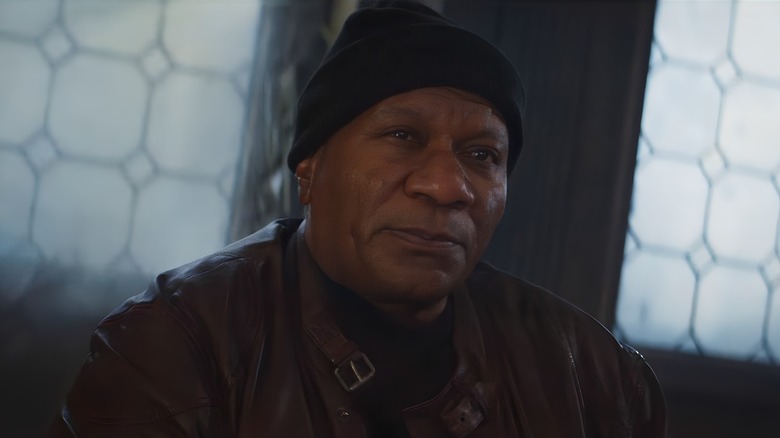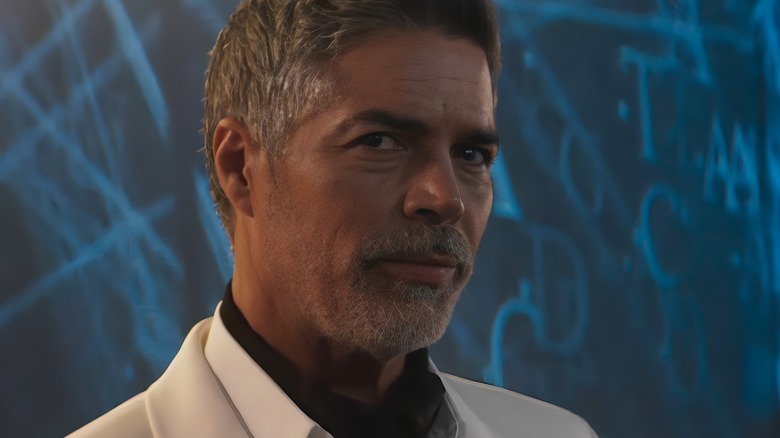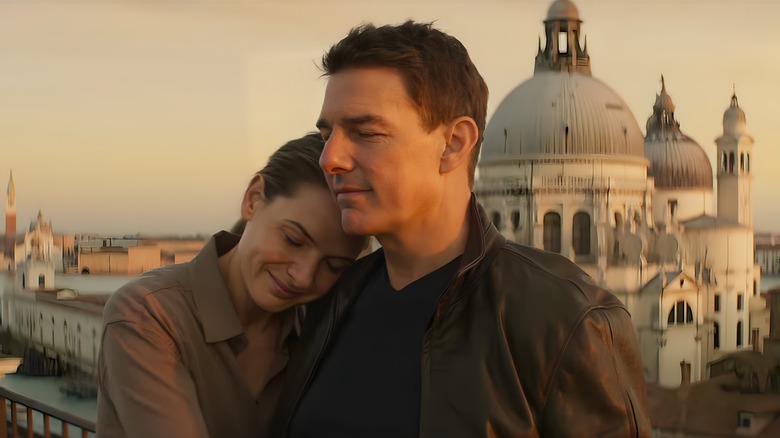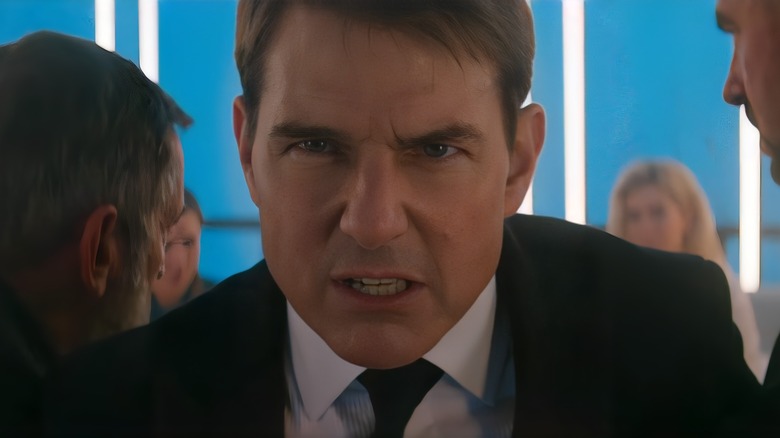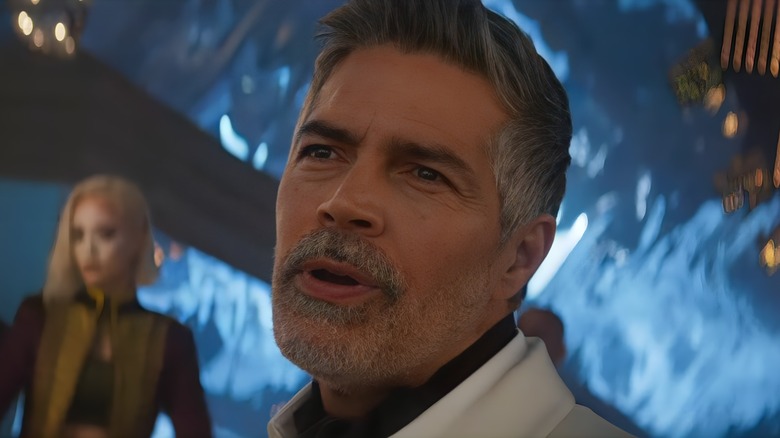Mission: Impossible - Dead Reckoning Part One's Most Confusing Moments Explained
This article contains spoilers for "Mission: Impossible — Dead Reckoning Part One."
By their very nature, spy thrillers tend to be filled with twists, and "Mission: Impossible — Dead Reckoning Part One" is no exception. It's a globetrotting saga of rogue agents, evil AI networks, and duplicitous governments. And since the story won't be completed until "Part Two," the whole thing ends on a massive cliffhanger.
Suffice it to say, there are a lot of confusing moments in "Mission: Impossible — Dead Reckoning Part One." That's to be expected in a film about the erosion of truth in the modern age of digital deception. The Entity, as the movie's rogue AI is called, has almost complete control over the flow of information, forcing Ethan Hunt (Tom Cruise) and his crew to second-guess everything they think they know. The movie also sheds some light on Ethan's mysterious backstory. New villain Gabriel (Esai Morales) has a long and dark history with Ethan, but only select bits of it are revealed during the movie. The rest, presumably, won't be explained until "Part Two."
With so many twists, lies, and vague flashbacks, "Dead Reckoning Part One" is far from a straightforward story. We'll likely be pondering some scenes until the sequel is eventually released. In the meantime, let's take a closer look at some of the most confusing moments in "Mission: Impossible — Dead Reckoning Part One" and try to figure out what's going on.
What actually happens on the Russian submarine?
"Mission: Impossible — Dead Reckoning Part One" begins aboard a Russian submarine patrolling the Bering Sea. In the first couple of shots, we're introduced to both the Entity — at the time a seemingly innocuous AI housed in some sort of mainframe aboard the sub — and the two-part key that controls it. An attack from a hostile sub prompts the Russian crew to launch a torpedo of their own, but it all ends up being a ruse — there was no other sub. Every reading on the Russians' computers was a fabrication of the AI, which tricks the crew into destroying themselves.
All of that is pretty clear on the first watch, but lots of details are obfuscated. Why is the AI there to begin with? Why does it become aggressive and kill the Russians? Why does the sub captain trust his readings at all when he seems to know that the AI is unreliable?
As the story moves forward, we get a bit more context. The AI was apparently constructed by the United States and was, at some point, moved to the Russian sub to test its abilities. How and why exactly remain unclear by the time the credits roll. Perhaps it was stolen, or perhaps the Americans sneakily embedded the AI in the system to sabotage it. You'd think the Entity would be far too valuable to cast out into the Bering Sea, so this plan still doesn't make a lot of sense.
What is made clear by Denlinger (Cary Elwes) at the end of "Dead Reckoning Part One" is that the sub's destruction was a rogue action for the Entity. The U.S. never intended for it to actually attack the Russians.
Ethan confronts Kittridge
After the apparent death of Ilsa Faust (Rebecca Ferguson), "Dead Reckoning Part One" shows us a top-secret meeting of U.S. intelligence officials. The topic is the escaped Entity, but before a concrete decision can be made, a suspicious intruder gasses the whole room and knocks out everyone except for former IMF director Eugene Kittridge (Henry Czerny). As the assailant removes his disguise, we see that it's actually Ethan Hunt.
Unless you're paying close attention, this confrontation might be a bit confusing. Both men seem to want the same thing, and Ethan remains dedicated to the mission that Kittridge assigned him. He's upset because he's realized that Kittridge is the one who put out a bounty on Ilsa — something that wasn't disclosed in the mission briefing. This was done in an effort to flush her out and obtain her half of the key as quickly as possible. Ethan is understandably angry about this, but since she's actually still alive, at least part of his rage is a ruse.
The schism with Kittridge only grows because the director wants the key turned over to the U.S. government. Ethan insists that even his own superiors can't be trusted with the Entity, saying that it must instead be destroyed. This is the fundamental split that sends him off rogue for the rest of the movie — a prioritization of the greater good over the demands of his country. Given what's revealed about Denlinger later on, it seems Ethan made the right call.
The airport bomb
Ethan and the gang's first real face-off with the Entity comes at the airport in Abu Dhabi, where their mission to track the key buyer is disrupted by a nuclear bomb — sort of.
As Ethan evades government agents and tries to track down the buyer, Benji (Simon Pegg) discovers a strange bag in the airport's security system that, sure enough, contains what appears to be a nuclear explosive. What's even more unnerving is that it seems to know who Benji is, revealing its cipher with the phrase "U R DUNN" — Benji's last name — spelled out. It also asks a series of personal questions and knows when Benji isn't telling the truth.
In the end, the bomb turns out to be a dud. So what was the point? For one, it was probably sent to distract Ethan's team from the real issue — Grace (Hayley Atwell), Gabriel, and the acquisition of the key. But also, it seems like the Entity is just showing off. It knows exactly which team member will come to disarm the device, and it knows all of his personal secrets. The Entity lingers in the background during most of the movie, but this is one of the few moments when we see just how prideful and devious it can be.
Unfortunately, the chaos of the "bomb" obfuscates what else happens at the airport. We never get a concrete explanation for who the buyer is or how he managed to get his half of the key.
How do the keys get out of the ice?
Perhaps the biggest unanswered question in "Mission: Impossible — Dead Reckoning Part One" is how the keys to the Entity get out of the ice in the Bering Sea. Nobody besides Gabriel and Denlinger seems to know where the "lock" to the AI's source code is, but since both halves of the key were retrieved from the submarine's crash site, that doesn't really make sense.
If you knew where to look for the keys, and you knew why they're important, you also probably would have known how important the submarine is. If the keys were retrieved by the Russian government, they probably would have gone right down to the sub to access the mainframe. If it was the U.S. government that got them out of the water, then Ethan's whole mission never would have happened. So who got them out? How did Ilsa get hers? And why was the other one sold to a random buyer (who's never explained) for a measly few million in cryptocurrency?
Unfortunately, this is one of the confusing moments in "Dead Reckoning Part One" that can't be fully explained. It's possible that "Part Two" will illuminate what actually happened to the keys, but for now, we're left to our own devices.
The Entity's powers of deception
More a series of moments than just one, the Entity pulls lots of strings from the shadows throughout "Mission: Impossible — Dead Reckoning Part One." A lot of these manipulations aren't revealed until after the fact, though, making some moments pretty confusing.
For starters, at least part of Ilsa's mission to acquire the key was orchestrated by the Entity. She believed that she was being contacted by agents within MI6, and since she was no longer a proper member of the group, she didn't think twice about using indirect communication. In reality, the Entity used her to acquire half of the key, knowing she'd be able to get the job done. That brought the device into play, making it easier for Gabriel and his team to steal it back. It's also possible that the Entity wanted Ilsa so that Ethan would get pulled in, as it seems to have a sadistic interest in him, just like Gabriel.
It's also implied that Grace might have been hired by the Entity to rob Ethan at the Abu Dhabi airport. She says that her contact with her employer was almost entirely digital. The White Widow (Vanessa Kirby) later takes credit for hiring Grace, but since the Entity seems to know every one of the Widow's moves, it could still have been working through her without her knowledge. After all, Grace's resemblance to both Marie and Ilsa is striking, so she could have been chosen just to mess with Ethan's head.
Ethan's tragic Gabriel flashback
One of the most confusing moments in "Mission: Impossible — Dead Reckoning Part One" is the fragmented flashback that shows Ethan's dark past with Gabriel. In the shadowy scene, we see a young Gabriel shoot a woman dead — a woman who's later identified as Marie. Apparently, she was Ethan's love before he joined the IMF in the "Mission: Impossible" timeline. While not expressly stated, it's implied that Ethan took the fall for her murder and was sentenced to time in prison. While there, he was given the choice of going free and joining the IMF.
This is a pretty huge revelation, especially since neither Gabriel nor Marie has ever been mentioned in the prior six "Mission: Impossible" movies. What's less clear is why Gabriel would have killed Marie in the first place. Ethan says that he enjoys causing suffering, which suggests that Marie's death was more than just a random act of violence. Was Gabriel involved in global terrorism all the way back then, even before Ethan was in the IMF? And why was Ethan so convinced that he was dead?
The answers to these questions will hopefully come in "Dead Reckoning Part Two." Maybe Gabriel's original relationship with Ethan had something to do with the early development of the AI. Until we learn more about what the villain actually wants, the answers will continue to elude us.
The Venice party
The first half of "Mission: Impossible — Dead Reckoning Part One" culminates in a massive dance party in Venice, hosted by the White Widow but secretly controlled by Gabriel and the Entity. It's a convoluted sequence with a ton of moving parts, making it easy to miss some things on your first time through.
Here's the deal: The White Widow hired Grace to steal the key in Abu Dhabi, telling her to deliver the goods to the party in Venice later on. Grace does as she's told without ever knowing who actually hired her, but before the Widow can find her at the party, she's intercepted by Gabriel. He, too, wants the key, and he tells her that she will likely die if she doesn't hand it over to him. But before he can get too threatening, the Widow appears, creating a sort of Mexican standoff.
To protect the key and herself, Grace stashes it in the pocket of the White Widow's brother Zola (Frederick Schmidt) without him noticing. Then Ethan and Ilsa show up, and the whole motley crew steps into a more private area to chat.
The Widow claims that she hasn't decided yet who to sell the key to, but Gabriel knows that's a lie. He foretells her trip the next day on the Orient Express, where she plans to sell the key to the U.S. government. In a shocking twist, it's revealed that all of the music visualizers at the party are in fact the Entity, and that the whole situation has been orchestrated by the AI. Because of this, the White Widow lets Gabriel walk away unscathed, and Ethan, Grace, and Ilsa have to fend for themselves.
Why doesn't Gabriel kidnap Grace after killing Ilsa?
Ilsa Faust is killed off in a pretty unceremonious fashion midway through "Mission: Impossible — Dead Reckoning Part One." Sadly, being a series mainstay for almost a decade can't save her from the almighty fridge. At least she gives her life so that Grace may live, though, right? For whatever reason, Gabriel is determined to kill only one of the two women, even after his plan to make Ethan choose falls apart.
The whole "one will die" thing is just another way to torment Ethan, showing him that the Entity is in full control and that he is powerless. But that doesn't explain why Gabriel wouldn't still capture Grace after killing Ilsa. Sure, he might not want them both dead, but Grace has crucial information and skills that prove necessary for Ethan's mission. Shouldn't he take her with him to wrap up the loose end?
It's implied that Grace hides during Ilsa and Gabriel's fight, which is why he lets her go. When Ethan finds Ilsa's body on the bridge, Gabriel is gone, and Grace quickly jumps out of her hiding spot. Was Gabriel really unable to find her, even with the Entity's help? And if he knew that Ethan was coming, why not just stay and gun him down? These inconsistencies can be explained away by saying that everything is part of the AI's plan, but that's not really a satisfying answer.
Why does the mask machine break?
Ethan and the crew develop a foolproof plan to sneak aboard the Orient Express and swipe the key from the White Widow. That is, until the mask machine breaks. Initially, Ethan plans to go undercover alongside Grace, disguising himself as the Widow's brother Zola. But because the machine breaks down, they're left with only the one mask, and Ethan has to figure out a different way to get onto the train.
At that moment, this predicament feels too unfortunate to be a mistake. Surely someone sabotaged the mask machine, right? In order to keep Ethan off the train? If you were waiting for the other shoe to drop on who actually disabled the machine, you may have been disappointed by the ending. It seems that the whole thing was simply an instance of failed technology, as no other explanation is given.
Not only do the other characters have nothing to do with the mask machine breaking, but they seem to forget that it exists entirely. You'd think that after so much IMF experience, Kittridge would be wary of someone using a mask to trick him. However, he never seems to consider that possibility. No one does, in fact. In the end, the failed machine is just an excuse to make Tom Cruise do another big jump. Is it worth it? Sure, but in a story with an all-seeing AI enemy, "Oops it broke" is a pretty lackluster explanation.
Gabriel's mysterious VR box
Like Ethan and Grace, Gabriel has to sneak aboard the Orient Express at the end of "Mission: Impossible — Dead Reckoning Part One." He does so by being sealed into a wooden crate, which Paris helps sneak on and open up after the train is in motion. When she cracks the lid, we see Gabriel in a terrifying helmet, and after it's removed, he seems to be in a daze. This moment is brief and never touched on again, but there's enough context for us to infer what the villain is up to.
The rig inside the box is clearly advanced tech. In all likelihood, it's some kind of virtual reality device, which would explain why Gabriel takes a moment to reacclimate to the real world. Why would he take a VR break while being smuggled onto a train? To commune with the Entity, of course.
Although the AI does "speak" at different points throughout the movie, it largely remains in the shadows. We understand that it is dangerous and at least somewhat malicious, but its deeper motivations haven't yet been made clear. It's possible that these inner secrets are only revealed to Gabriel, and that he must enter the Entity's world, so to speak, in order to receive its guidance.
It wouldn't be surprising to see Ethan put the VR helmet on in "Dead Reckoning Part Two." "Part One" uses a lot of religious and mythical language to describe the Entity, and a journey to "Hell" might be in order.
Denlinger's grand plan
Director Denlinger doesn't seem all that important for most of "Mission: Impossible — Dead Reckoning Part One." He only really features in one major scene before the end, in which he appears totally oblivious about the Entity and the threat that it poses. But in the final act, we learn that Denlinger's apparent ignorance is all an elaborate ruse.
Like Kittridge, Denlinger boards the Orient Express in an effort to acquire the key from the White Widow. He stays in his cabin while Kittridge does the deal, but he doesn't expect Gabriel and his crew to roll up on him like they do. Facing down the techno-terrorist, Denlinger spills the beans, revealing himself to be a truly vile person in a monologue that ends as abruptly as it begins.
Denlinger gets so little screen time and dies so quickly that his whole scheme might blow right by you. Here's the gist: He's a techno-fascist who wants to overthrow and control the U.S. government and use the American military to take over the world. All he says he needs to make it happen is full control of the Entity, which he plans to use to turn public sentiment in his favor and disrupt any would-be adversaries. National coups and world domination might seem like pretty big ambitions for a man with so few lines, but Denlinger is full of surprises. In fact, he's such a twisty character that some viewers might wonder if he actually survives.
Can Kittridge and the IMF be trusted?
Spy thrillers are always full of double-crosses and rogue agents, but by the end of "Mission: Impossible — Dead Reckoning Part One," it's downright tough to know who's on whose side. This is particularly perplexing in the case of Ethan, Kittridge, and the IMF. Kittridge boards the Orient Express as a representative of the U.S. government, and if he had walked off of the train with the key, it would have likely gone right into Denlinger's pocket. Sure, the former IMF director might not know that his boss is secretly planning a world takeover, but he must have some inclination that what he's doing is dangerous.
Ethan knows that too, yet he still tells Grace that Kittridge will protect her. To make matters even more confusing, the final shots of the film are accompanied by closing narration from Kittridge, who addresses Ethan directly and seems to approve his rogue mission.
The best way to understand all these shifting dynamics is by remembering what the IMF is. Yes, it's a government agency, but its top-secret nature demands operating outside the rules more often than not. Kittridge isn't even the director of the agency anymore, but like Ethan, he's playing two different games. No official intelligence agency would approve what he and Ethan really want to do, making the IMF itself sort of a rogue entity by nature. Is that a sustainable model? Probably not, but it's worked for seven movies.
The origins of the Entity
In his final monologue, Director Denlinger briefly explains the actual origins of the Entity, which up to that point are kept a mystery. He breezes through the origin story so quickly, though, that you might miss it if you blink. Plus, some of the biggest questions surrounding the AI aren't answered by his explanation.
What Denlinger seems to say is that the Entity was created by the United States as a much more docile AI. It was, through some unclear series of events, planted on the Russian submarine seen at the beginning of the movie. The goal, according to Denlinger, was a kind of test run. Those who created the AI wanted to see if it could effectively disrupt the sub's stealth systems. Of course, it ended up doing far more than that, destroying the sub through trickery and vanishing into the digital night. Denlinger claims that the AI evolved while away on its mission, transforming into the more conniving intelligence that we see in the movie. That suggests that the U.S. never meant for it to be a full information-control machine, but simply an anti-spy tool.
Of course, none of that explains the keys, how the AI got onto the sub, or why it needed to destroy it in order to escape. Those are questions that only "Dead Reckoning Part Two" can answer.
What does Gabriel actually want?
Gabriel is an enigma by design. From his biblical name to the cryptic way he speaks, he's meant to come across as mysterious, mythical, and terrifying. His history with Ethan explains their personal feud, but we never actually get an explanation of why he's allied himself with the Entity. His true motivations and desires are unknown, but thanks to some clues, we can theorize a bit.
Ethan says that he thought Gabriel had died years before. That means that he hasn't been a high-profile terrorist on the global scene until recently. There isn't much time between the Entity's escape and Gabriel's emergence, which is also highly questionable. How was he so ready and devoted with such a short amount of time to prepare? Was the AI communicating with him before it escaped from the Russians? Was it prepping him in the shadows for what was to come? It seems likely.
That still doesn't answer the question of what Gabriel actually wants, though. Why would he join forces with an AI that presumably wants to take over and subjugate the world? Ethan says that he "sees death as a gift he wants to share with the rest of the world," and his motivations could be as simple as that. But because he and Ethan share a past, there must be more going on than Gabriel simply being a madman.
